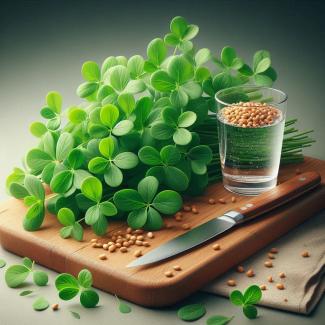
Ginkgo biloba, often referred to as a "living fossil," is one of the oldest tree species in the world, with a history of over 200 million years. Its medicinal properties have been recognized for centuries, particularly in Traditional Chinese Medicine (TCM), where it has been used to improve cognitive function, circulation, and overall well-being. In recent years, scientific research has begun to explore the specific benefits of Ginkgo biloba for sexual health, demonstrating promising results for both men and women. This comprehensive guide will dive deep into how Ginkgo biloba can benefit sexual health, the various forms it is available in, and the feasibility of growing this ancient tree.
How Ginkgo Biloba Benefits Sexual Health in Males
Sexual health in men is influenced by a variety of factors, including circulation, hormonal balance, psychological well-being, and vascular health. Many men experience sexual issues like erectile dysfunction (ED), low libido, or performance anxiety. Ginkgo biloba can provide a natural solution to some of these problems due to its effects on blood flow, nitric oxide production, and anxiety reduction.
1. Improved Blood Flow and Circulation
One of the most significant ways that Ginkgo biloba benefits male sexual health is by improving blood circulation. An erection requires the dilation of blood vessels in the penis to allow an influx of blood into the corpora cavernosa. Erectile dysfunction often arises due to poor circulation, especially in men with underlying vascular conditions.
Ginkgo biloba contains flavonoids and terpenoids, compounds known to improve vascular health by promoting vasodilation (the widening of blood vessels). By improving blood flow to the penis, Ginkgo biloba can help men achieve and maintain an erection. Several studies support this notion:
- A study published in the Journal of Urology (1998) found that men with erectile dysfunction experienced significant improvement in their ability to achieve an erection after several months of Ginkgo biloba supplementation.
- In another study, published in Human Psychopharmacology: Clinical and Experimental (2000), Ginkgo biloba was found to increase blood flow to peripheral regions, including the genitals, supporting its use in treating erectile dysfunction.
2. Increased Nitric Oxide Production
Nitric oxide (NO) is a molecule that plays a crucial role in relaxing smooth muscle tissue within blood vessels, thus enhancing blood flow. Ginkgo biloba has been shown to increase nitric oxide production, which is essential for maintaining an erection. Increased nitric oxide levels improve vasodilation, allowing for enhanced blood flow to the penis, which is vital for erectile function.
In a study published in the Archives of Sexual Behavior (2008), men who took Ginkgo biloba experienced increased nitric oxide levels, which led to better erectile function and overall sexual satisfaction. This makes Ginkgo a suitable supplement for men dealing with vascular-related erectile issues.
3. Reduced Performance Anxiety
Ginkgo biloba is often praised for its calming effects on the mind. Stress and anxiety are significant contributors to sexual dysfunction, particularly in cases where psychological factors play a larger role than physiological ones. Ginkgo’s impact on reducing anxiety has been well-documented in various studies. For instance, a study conducted by the University of California, San Francisco (2000) found that men experiencing sexual dysfunction as a side effect of antidepressant medications saw improvements in sexual performance when taking Ginkgo biloba. The calming effect of Ginkgo helped reduce performance anxiety, allowing for more satisfactory sexual encounters.
4. Libido Boosting Effects
Testosterone is the primary hormone driving libido in men, and healthy levels of testosterone are crucial for sexual health. While Ginkgo biloba is not directly involved in testosterone production, it improves blood circulation, enhances overall vitality, and reduces oxidative stress—all of which can support healthy testosterone levels. This can lead to an increase in libido and sexual performance.
Some studies, such as the one published in the Journal of Clinical Psychopharmacology (2004), have suggested that Ginkgo biloba supplementation can improve sexual desire in men, especially those experiencing a decline in libido due to age or medication use.
5. Antioxidant Properties and Protection from Oxidative Stress
Oxidative stress occurs when there is an imbalance between free radicals (unstable molecules that can cause cellular damage) and antioxidants (molecules that neutralize free radicals). Over time, oxidative stress can damage blood vessels and tissues, leading to sexual dysfunction. Ginkgo biloba is rich in powerful antioxidants like flavonoids and terpenoids, which help combat oxidative stress.
By reducing oxidative damage to blood vessels and tissues in the genital region, Ginkgo biloba helps maintain the health of these structures, which is critical for optimal sexual performance. Men who take Ginkgo biloba supplements may experience enhanced vascular health, which directly supports erectile function.
How Ginkgo Biloba Benefits Sexual Health in Females
While male sexual dysfunction often centers on issues like erectile dysfunction and low testosterone, female sexual health is influenced by a complex interplay of factors including hormonal balance, circulation, and psychological well-being. Ginkgo biloba can offer benefits in these areas as well, making it a valuable supplement for improving female sexual health.
1. Improved Blood Flow to the Genital Area
Sexual arousal in women is heavily dependent on blood flow to the genital area. Adequate circulation helps stimulate the tissues of the clitoris and vaginal walls, which leads to arousal and lubrication. Women experiencing sexual arousal disorders may benefit from Ginkgo biloba’s ability to enhance blood flow.
In a study published in the Journal of Sex Research (2004), women who took Ginkgo biloba reported improvements in sexual arousal and overall sexual satisfaction. This was attributed to the herb's ability to enhance circulation, especially in the genital region. This improved blood flow can help increase sensitivity and lubrication, making sexual experiences more pleasurable.
2. Reduction in Anxiety and Stress
Many women experience sexual dysfunction related to psychological factors, such as anxiety, stress, or depression. Ginkgo biloba's well-known anxiolytic (anxiety-reducing) effects can improve sexual desire and performance by helping women feel more relaxed during sexual activity. By reducing the anxiety that may be inhibiting arousal, Ginkgo can improve sexual satisfaction.
In a study conducted at the University of Southern California (2001), women taking antidepressants who experienced reduced libido saw an improvement in their sexual desire, arousal, and ability to reach orgasm when supplementing with Ginkgo biloba. This suggests that Ginkgo can counteract some of the negative sexual side effects of medications and psychological conditions.
3. Balancing Hormones
Hormonal balance is critical for female sexual health, particularly in regard to estrogen and progesterone. These hormones regulate sexual desire, vaginal lubrication, and reproductive health. Ginkgo biloba's impact on circulation, combined with its antioxidant properties, can support hormonal balance by improving the overall health of the endocrine system.
This is especially important for postmenopausal women, who often experience a decline in estrogen levels. Ginkgo biloba may help alleviate some of the symptoms of menopause, such as vaginal dryness and reduced libido, by improving circulation and supporting hormone regulation.
4. Enhanced Lubrication and Sensitivity
Vaginal dryness can make sexual activity uncomfortable or even painful, reducing a woman's desire for sex. Ginkgo biloba’s ability to increase blood flow to the genital area may help improve natural lubrication, making sex more comfortable and enjoyable. Women who experience vaginal dryness due to hormonal imbalances or menopause may find Ginkgo biloba particularly beneficial in this regard.
A study published in the Journal of Women's Health (2003) found that women who took Ginkgo biloba supplements experienced an increase in vaginal lubrication, which helped reduce discomfort during intercourse. This suggests that Ginkgo biloba can play a role in improving sexual health for women experiencing age-related sexual issues.
5. Antioxidant Support for Reproductive Health
Oxidative stress can also impact female sexual health by damaging the tissues and blood vessels of the reproductive system. Ginkgo biloba’s potent antioxidant properties can help protect against this damage, maintaining the health of vaginal tissues and improving sexual function.
Women who take Ginkgo biloba regularly may experience better overall reproductive health, which can enhance sexual satisfaction and improve fertility.
Can I Grow Ginkgo Biloba?
Yes, you can grow Ginkgo biloba! This ancient tree is surprisingly hardy and can be cultivated in a variety of climates, though it thrives best in temperate zones. Ginkgo biloba is known for its resilience and ability to withstand pollution, making it a popular tree for urban landscapes.
Growing Conditions
- Climate: Ginkgo biloba prefers temperate climates with well-defined seasons. It can tolerate cold winters and hot summers, though it does best in areas with moderate weather patterns.
- Soil: Ginkgo biloba is not very particular about soil types, though it grows best in well-drained, slightly acidic to neutral soils. It can tolerate poor soil conditions but may grow more slowly in less fertile environments.
- Sunlight: Ginkgo biloba requires full sunlight to thrive. It should be planted in an area where it will receive at least 6 hours of direct sunlight each day.
- Watering: Ginkgo biloba is drought-tolerant once established, but young trees need regular watering until their root systems are fully developed.
Planting and Care
- Planting: Ginkgo biloba trees can be grown from seeds or young saplings. Seeds should be planted in the spring, and saplings can be planted in the spring or fall.
- Spacing: These trees can grow quite large, reaching heights of up to 80 feet or more. Be sure to plant your Ginkgo biloba tree in an area where it has plenty of space to grow.
- Pruning: Ginkgo biloba trees do not require much pruning, but you can trim them to maintain a desired shape or remove any dead or damaged branches.
Lifespan and Growth Rate
Ginkgo biloba trees are slow growers, often taking several decades to reach their full height. However, they are incredibly long-lived, with some trees known to live for over 1,000 years. Once established, a Ginkgo biloba tree will require minimal care and can be a beautiful, enduring addition to any garden.
In What Forms is Ginkgo Biloba Available?
Ginkgo biloba is available in a variety of forms, making it easy to incorporate into your daily routine, whether you prefer supplements, teas, or topical applications. Here are some of the most common forms of Ginkgo biloba:
1. Capsules and Tablets
The most popular way to consume Ginkgo biloba is in the form of capsules or tablets. These supplements typically contain standardized extracts of Ginkgo biloba, ensuring a consistent dose of its active compounds. Ginkgo biloba capsules and tablets are widely available in health food stores, pharmacies, and online.
2. Liquid Extracts
Ginkgo biloba liquid extracts are another popular option. These extracts are typically more concentrated than capsules or tablets and can be added to water, tea, or other beverages. Liquid extracts offer a more flexible dosing option for those who prefer not to take pills.
3. Tea
Ginkgo biloba leaves can be brewed into a tea, which is a popular option for those who enjoy a more traditional approach to herbal medicine. Ginkgo biloba tea is often combined with other herbs to enhance its flavor and medicinal properties.
4. Topical Creams and Ointments
Ginkgo biloba is also available in the form of topical creams and ointments, which are used to improve skin health and reduce inflammation. While these products are not typically used for sexual health, they offer a way to experience the benefits of Ginkgo biloba for skin and circulatory health.
5. Dried Leaves
For those who prefer to make their own Ginkgo biloba preparations, dried Ginkgo biloba leaves are available for purchase. These leaves can be used to make tea, tinctures, or other herbal remedies at home.
6. Powder
Ginkgo biloba is also available in powdered form, which can be added to smoothies, juices, or food. This is a convenient option for those who want to incorporate Ginkgo biloba into their daily routine without taking capsules or tablets.
7. Ginkgo Biloba in Combination Formulas
Ginkgo biloba is often included in combination formulas with other herbs and supplements designed to enhance cognitive function, improve circulation, or support sexual health. These formulas may include ingredients like ginseng, maca, or L-arginine, which complement Ginkgo biloba’s effects.
Ginkgo biloba offers a wide range of benefits for sexual health, both for men and women. By improving circulation, reducing anxiety, and supporting hormonal balance, Ginkgo biloba can help alleviate common sexual health issues such as erectile dysfunction, low libido, and sexual arousal disorders. Whether taken in the form of capsules, tea, or liquid extract, Ginkgo biloba is a versatile and effective supplement for improving overall vitality and sexual well-being.
In addition to its sexual health benefits, Ginkgo biloba can be grown at home, providing a beautiful and enduring addition to your garden. With proper care, this ancient tree can thrive in a variety of climates and provide its medicinal benefits for generations to come.
Whether you're seeking to improve your sexual health or simply looking to enhance your overall well-being, Ginkgo biloba is a powerful and time-tested herbal remedy that deserves a place in your daily routine.






